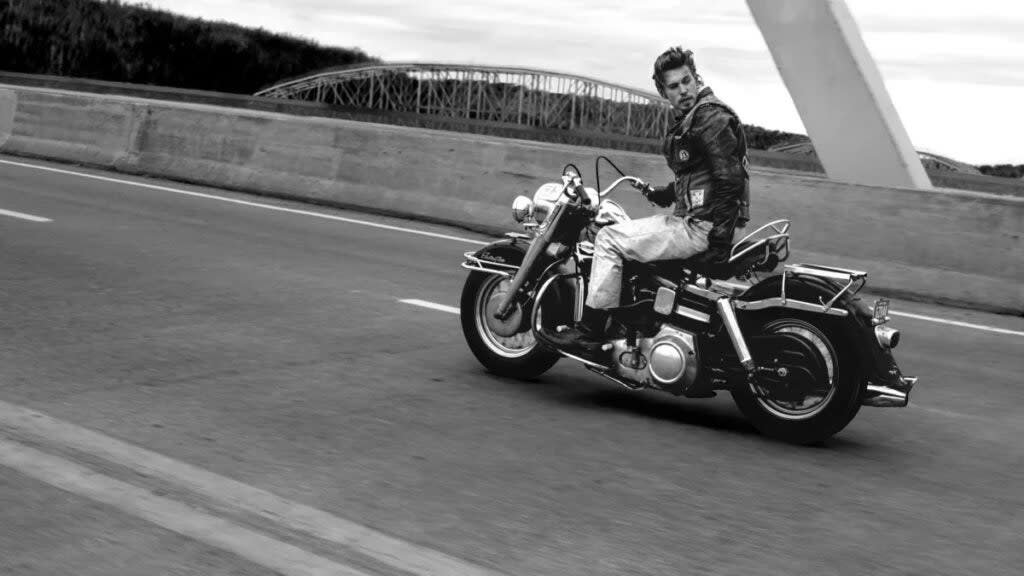‘The Bikeriders’ Review: Jeff Nichols’ Roaring and Star-Studded Ode to a ’60s Motorcycle Club

- Oops!Something went wrong.Please try again later.
- Oops!Something went wrong.Please try again later.
- Oops!Something went wrong.Please try again later.
- Oops!Something went wrong.Please try again later.
Some films merely offer you a clockwork plot. Others, like Jeff Nichols’ smokin’ cool “The Bikeriders,” whisk you away with a roar of mood and atmosphere.
That’s no surprise coming from the versatile director of “Mud,” “Loving” and “Midnight Special,” all seemingly different (but equally wondrous) films with one common denominator: a precise, wistful sense of place and tone. As soon as we spot Austin Butler on a bar stool sporting a badass Vandals Chicago jacket on his back, that exacting disposition is evident here, too. With appealingly greased and molded hair, Butler looks like he just stepped away from the “Elvis” set for a swift cigarette break, wearing the invincible aura of a movie star like it’s his second skin. Vandals is the name of the motorbike clique Butler’s terse Benny is a part of. And to get him to take that jacket off—like a pair of menacing naysayers who don’t take kindly to bikers ask him to do—you’re going to have to kill him first. Or simply die trying.
That temperament is an instant hook between the audience and Benny—as well as whatever allegiances he swore to a group of leather-clad, chopper-obsessed fellas, good or bad. In other words, it’s impossible to witness Benny’s natural charisma and undercurrent of dauntlessness in that early scene and not promptly feel eager to dive a little deeper beneath the surface. That aroused curiosity feels like an echo of what Nichols must have felt when he saw Danny Lyon’s mesmerizing 1968 photography book with the same name, that captures both the façade and detailed personalities of a Chicago-based motorcycle club in the ‘60s. Those photos are all black-and-white, but Nichols—more concerned with transposing his own impression of the pictures, than simply copying its pages onto the big screen—works in glorious, grainy color. His cinematographer Adam Stone captures the initially exuberant but gradually rusty machinations of the collective, across dusty roads and alleyways.
It’s gratifyingly surprising that a story of such masculine senses, partly about the sometimes ill-advised search for a manly identity, gets to have a woman narrator. If “The Bikeriders” is the “Goodfellas” of easy rider flicks—and there is enough evidence of long takes, shifting perspectives and gang dealings that Nichols is taking a Scorsese-like route here—then the film’s lead personality Kathy is its Karen Hill. Portrayed with frisky precision by the always terrific Jodie Comer (who’s as at ease with her character’s specific Midwestern accent as much as she is with all the puffy hairdos), Kathy is introduced to us in a laundromat early on. She is being questioned by the Lyon stand-in Mike Faist (“West Side Story”), who gives the story an investigative, “Citizen Kane”-like shape through the interviews he conducts with various members of the group. “Five weeks later, I married him,” Kathy says with a spirited hint of naughtiness in her voice about the first time she met Benny. We understand why she fell under his spell as soon as she laid eyes on him. We’ve been there too after all, and she’s only human.
Then we gradually get acquainted with other players of the band as Nichols revs up the pacing of “The Bikeriders.” There is the founder Johnny, played by a quietly intimidating Tom Hardy who puts every facial wrinkle and muscle, and accented hiss of his voice towards one the finest performances of his career. There is also Cal (Boyd Holbrook), Zipco (Michael Shannon), Wahoo (Beau Knapp), Corky (Karl Glusman) and Cockroach (Emory Cohen in his most major turn since “Brooklyn”) to round off the wild bunch.
Among the miracles of “The Bikeriders” is how we feel the sense of pride and camaraderie amid these men without ever losing sight of Kathy. In a lesser film, she would have been sidelined as a mere chronicler; either a cliched, overtly supportive spouse or a one-note nag who doesn’t approve of her husband’s passion. In certain turns of the story, Kathy does both in the name of encouraging and disapproving. But Nichols, smartly, never reduces her down to a stereotype. Throughout, Kathy serves as the tale’s moral and narrative spine, lifted up by Comer’s nimble and dedicated performance as a woman in search of survival amid escalating toxicity.
Costumed to nonchalant perfection by Erin Benach and enlivened by Chad Keith’s brawny production design, “The Bikeriders” is a rise-and-fall tale at its heart of hearts with a “Boogie Nights” ring to it. It’s the vanishing of a subculture in the hands of those who go against its introductory tenets, not unlike many a transitionary period in the evolving history of movies and music. When that fate eventually finds the fictional Vandals, the film dials up its until-then sporadic violence (and Scorsese references, like a quick cut or two to some swiftly edited murders). Both nostalgic for a bygone past and clear-eyed about the perils of that nostalgia, Nichols grants the audience an exit both high-pitched and melancholically bittersweet. In that, Kathy and Benny don’t exactly end up with egg noodles and ketchup; but a future on their own tentative terms. As Lyon’s beautifully textured real-life photos accompany the end credits to haunting effect, you feel the sense of loss deeply, along with the promise of what might come next.
The post ‘The Bikeriders’ Review: Jeff Nichols’ Roaring and Star-Studded Ode to a ’60s Motorcycle Club appeared first on TheWrap.

